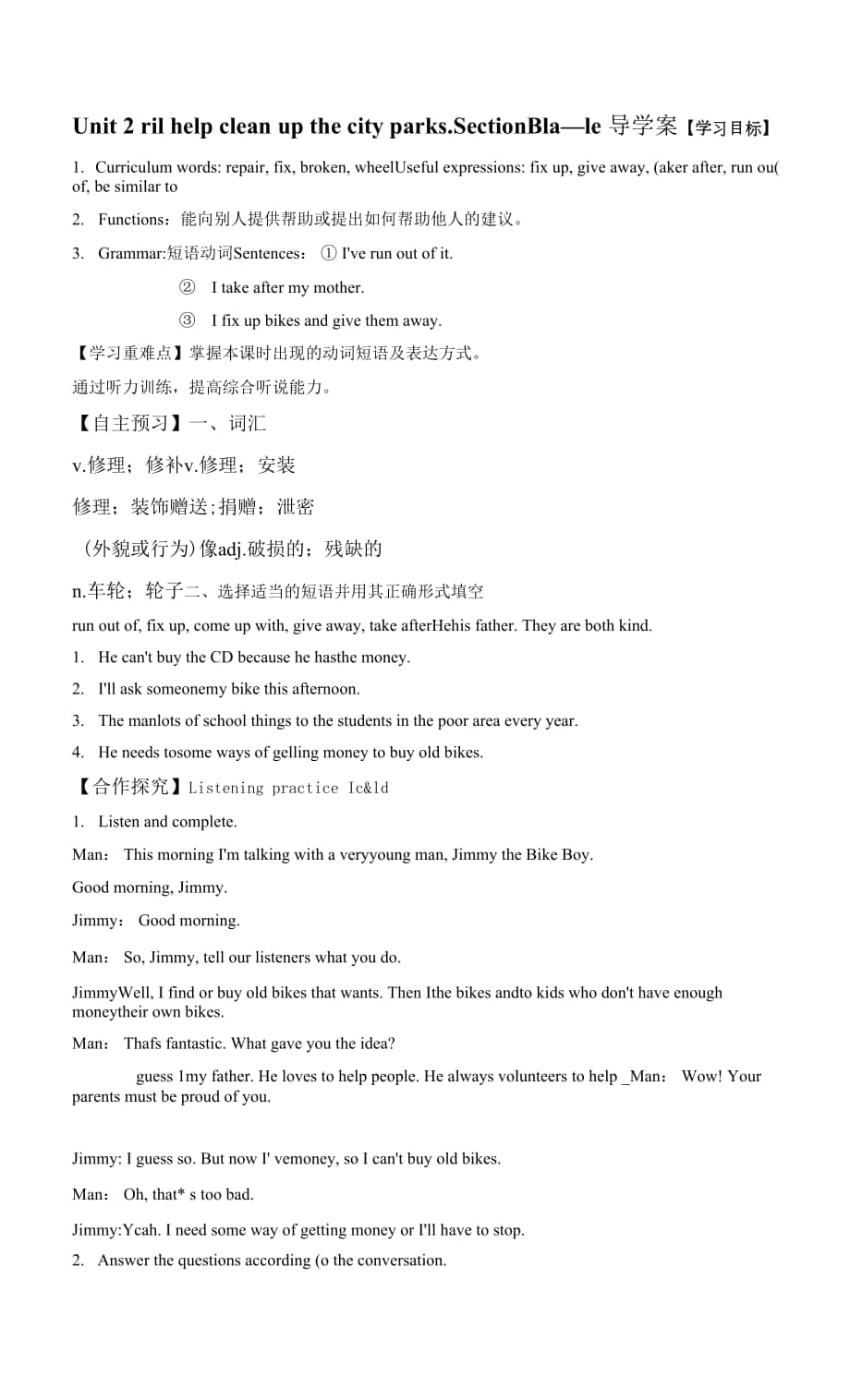《Unit2SectionB1a-1e導(dǎo)學(xué)案 人教版英語(yǔ)八年級(jí)下冊(cè).docx》由會(huì)員分享����,可在線閱讀,更多相關(guān)《Unit2SectionB1a-1e導(dǎo)學(xué)案 人教版英語(yǔ)八年級(jí)下冊(cè).docx(2頁(yè)珍藏版)》請(qǐng)?jiān)谘b配圖網(wǎng)上搜索��。
1���、Unit 2 ril help clean up the city parks.SectionBla—le 導(dǎo)學(xué)案【學(xué)習(xí)目標(biāo)】
1. Curriculum words: repair, fix, broken, wheelUseful expressions: fix up, give away, (aker after, run ou( of, be similar to
2. Functions:能向別人提供幫助或提出如何幫助他人的建議��。
3. Grammar:短語(yǔ)動(dòng)詞Sentences: ① I've run out of it.
② I take after my mother
2���、.
③ I fix up bikes and give them away.
【學(xué)習(xí)重難點(diǎn)】掌握本課時(shí)出現(xiàn)的動(dòng)詞短語(yǔ)及表達(dá)方式。
通過聽力訓(xùn)練����,提高綜合聽說能力。
【自主預(yù)習(xí)】一����、詞匯
v.修理;修補(bǔ)v.修理��;安裝
修理����;裝飾贈(zèng)送;捐贈(zèng);泄密
(外貌或行為)像adj.破損的��;殘缺的
n.車輪����;輪子二、選擇適當(dāng)?shù)亩陶Z(yǔ)并用其正確形式填空
run out of, fix up, come up with, give away, take afterHehis father. They are both kind.
1. He can't buy the CD because h
3����、e hasthe money.
2. I'll ask someonemy bike this afternoon.
3. The manlots of school things to the students in the poor area every year.
4. He needs tosome ways of gelling money to buy old bikes.
【合作探究】Listening practice Ic&ld
1. Listen and complete.
Man: This morning I'm talking with a veryyou
4、ng man, Jimmy the Bike Boy.
Good morning, Jimmy.
Jimmy: Good morning.
Man: So, Jimmy, tell our listeners what you do.
JimmyWell, I find or buy old bikes that wants. Then Ithe bikes andto kids who don't have enough moneytheir own bikes.
Man: Thafs fantastic. What gave you the idea?
guess 1my fa
5����、ther. He loves to help people. He always volunteers to help _Man: Wow! Your parents must be proud of you.
Jimmy: I guess so. But now I' vemoney, so I can't buy old bikes.
Man: Oh, that* s too bad.
Jimmy:Ycah. I need some way of getting money or I'll have to stop.
2. Answer the questions accordin
6、g (o the conversation.
1) . Why do we call Jimmy a Bike Boy?
2) . Who does he want to help?
3) . Does his father support him?
4) . What's Jimmy's problem now?
5) . What will Jimmy's parents think of him?
3. Finish le.
【知識(shí)點(diǎn)探究】1 run out of = use叩“用完��,用光”����。句子的主語(yǔ)是人或使用的物。注意不能用 于被動(dòng)語(yǔ)態(tài)��。
I am running o
7��、ut of money.= My money is running out.
Arun out (of)還有“跑出…"之意。
翻譯: 我的紙用完了���。I havemy paper.
墨水快要用完了����。The ink is.
Tom 跑出 了教室�����。Tomthe classroom.
2.1 take after my mother.我長(zhǎng)得像我媽�����。
(1) take after意為“(在外貌���、性格等方面)與(父母等)相像“�����,指由于血 緣關(guān)系而相似���。
(2) 同義短語(yǔ)為look like,多指外貌方面相似。
他性格像他父親����。Hehis father.
她看起來像她的母親��。Sheher
8�����、mother.
3 I fix it up. fix up = repair 修理fix意為“修理;安裝”����。
fix up修理,修補(bǔ)�����,為動(dòng)副結(jié)構(gòu)����,與mend, repair同義。
He isthose kites.他正忙于修補(bǔ)那些風(fēng)箏�����。
【辨析】 fix, repair, mendfix和repair都表示使受到一定損壞或失靈的東西恢復(fù)其性能或機(jī)能�����,其對(duì)象范 圍很廣,可以用「從道路�����、機(jī)器到日常用品,iin:repair/fix a machine/watch/road; 而mend表示修補(bǔ)破損的東西���,使其恢復(fù)原樣��,一般指較小的物品���,如:mend the window/shirt/sock。
Later he learned how to repair television sets.后來他學(xué)會(huì)了如何修理電視機(jī)����。
My mother is mending socks for me. 媽媽在為我補(bǔ)襪子。
 Unit2SectionB1a-1e導(dǎo)學(xué)案 人教版英語(yǔ)八年級(jí)下冊(cè).docx
Unit2SectionB1a-1e導(dǎo)學(xué)案 人教版英語(yǔ)八年級(jí)下冊(cè).docx

